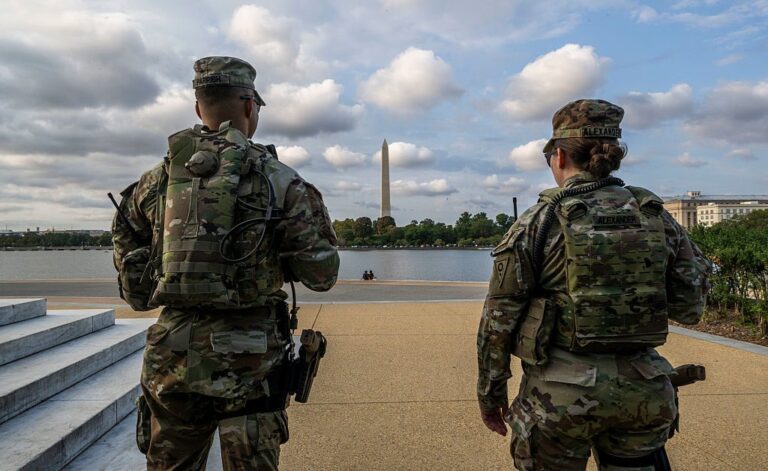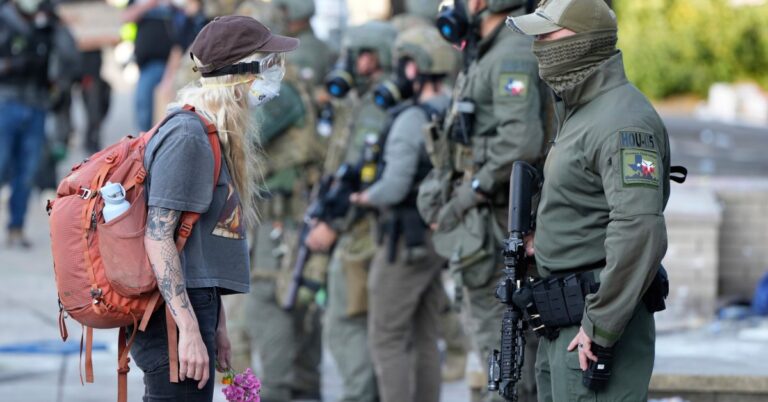President Donald Trump’s attempted takeover of Washington, D.C. is a bright red flag for American democracy and the rule of law. If the American people accept that Trump’s show of federal force is about crime—and that crime justifies the militarization of D.C. or any other city—our country could be well on its way to becoming a police state.
Already, Trump is discussing plans to intervene in other blue cities. National Guard forces are poised to deploy in Memphis, and Trump has said that Chicago is “probably next.” Trump’s actions in the capital illustrate why this approach is such a dangerous abuse of power.
Starting on August 11, on the pretext of addressing local crime in Washington D.C., Trump commandeered the Metropolitan Police Department (MPD); flooded the city with 500 federal law enforcement officers from the Department of Homeland Security, the FBI, and the Drug Enforcement Administration; and deployed 950 D.C. National Guard forces throughout the city. In addition, governors from multiple red states, including West Virginia, South Carolina, Georgia, Mississippi, Louisiana, Ohio, and Tennessee, have sent 1,300 National Guard forces to the District—most of them now armed—at the president’s invitation.
The Trump Administration disputes statistics from the D.C. police showing a steady downward trend in crime since 2023. But even if there had been a major spike in criminal activity, a mobilization of this scale is more suited to a foreign military attack—or, say, an assault on the U.S. Capitol by insurrectionists.
The conduct of these deployed officers is equally alarming. Federal agents have been filmed stopping and questioning people not engaged in any apparent illegal activity. Video footage that surfaced the weekend after Trump’s declaration of a “crime emergency” captured a group of six masked agents violently tackling an unarmed delivery driver and appearing to use a stun gun on him.
And on major commercial corridors, agents have set up traffic checkpoints, which may violate the Constitution under Supreme Court precedent. In the 2000 case of Indianapolis v. Edmond, the high court decided that traffic checkpoints as a means for general crime control violate the Fourth Amendment.
There is little indication that these heavy-handed actions are targeted at the “violent crime” that is cited in Trump’s executive order and is of genuine concern to many D.C. residents. Deployments are not concentrated in high-crime areas of the District; instead, they are prevalent in areas with significant tourist traffic. A striking percentage of arrests have been for immigration violations. Federal agents are aggressively removing people experiencing homelessness. Many of the operations have the look and feel of a photo opportunity—indeed, the administration reportedly sent social media teams to accompany the FBI on arrest missions.
As D.C. Mayor Muriel Bowser has noted, crime rates in D.C., demonstrated in MPD data show, have been steadily declining. Bowser attributed this drop in part to the presence of additional federal law enforcement agents, but it is far too soon to know whether this show of force has had a crime reduction effect. In any event, cities around the country have reduced crime dramatically without engaging in the tactics of a police state. In fact, many people in D.C. feel less safe, as evidenced by the sharp drop in restaurant attendance and tourism in D.C. since August 11. Notably, Bowser condemned as ineffective and harmful many of the core features of Trump’s D.C. takeover: the deployment of state National Guard forces, the conduct of masked ICE agents, and the subversion of local control.
In short, these actions smack of intimidation more than protection. Empirically, there is no correlation between the political party of a city’s mayor and crime rates, yet all of the cities Trump has name-checked—Los Angeles, Chicago, New York, Oakland, Baltimore, New Orleans, and Memphis—are led by Democrats. Trump’s D.C. takeover is could be understood as part of a campaign to punish those whom he considers to be his political opponents.
The threat to fundamental freedoms
To accomplish this end, Trump is taking a page from El Salvador’s President Nayib Bukele and other authoritarian rulers around the world: abusing emergency powers in the name of cracking down on crime.
Under Section 740 of the District of Columbia Home Rule Act, Trump can temporarily make use of the MPD “whenever the President of the United States determines that special conditions of an emergency nature exist which require the use of the Metropolitan Police force for federal purposes.”
By definition, an “emergency” is a sudden, unforeseen crisis. However serious the crime problem in D.C., it is not sudden or unforeseen. It is an ongoing issue that requires thoughtful, empirically-tested long-term solutions. And combating “violent, menacing street crime” is not a “federal purpose”; it is a textbook example of a local matter. While Trump’s executive order is dutifully sprinkled with references to protecting federal property and functions, many officers are being deployed far from any federal property. Fortunately, the president’s authority to draft the MPD into service ended on September 10.
As for Trump’s use of National Guard forces, it violates a centuries-old principle against military involvement in domestic law enforcement. This principle is a critical protection for both individual liberty and democracy, as an army turned inward can be a powerful instrument of oppression. Unfortunately, the law that enshrines this principle—the Posse Comitatus Act—is riddled with loopholes. But previous presidents have resisted the temptation to exploit them, and the law has served as a powerful norm notwithstanding its weaknesses. By populating D.C.’s street corners with soldiers, Trump is shredding that vital norm.
Now, Trump is threatening to follow a similar playbook in other blue cities. As a legal matter, the president doesn’t have the same authority to commandeer local police in those jurisdictions, nor does he command Guard forces by default in the states as he does in D.C. Moreover, it would violate the Constitution for governors to send their Guard forces into another state without the consent of its governor. The D.C. legal playbook simply isn’t available to Trump outside the district.
As we saw in June, however—when Trump federalized the California National Guard in response to protests in Los Angeles—there are other legal authorities the president can try to leverage. A federal judge recently held that the military’s actions in Los Angeles violated the Posse Comitatus Act, but that decision, which the administration has appealed, is not binding in other jurisdictions. And if governors cooperate with Trump to deploy Guard forces within their own state, as could happen in Memphis and New Orleans, many of the legal barriers to deployment fall away—even though the concerns about using soldiers to police Americans remain.
The choice we face
If we normalize what has happened in D.C. through acquiescence, we will have quietly conceded our democracy and our freedoms. One by one, major cities could become places where Americans are afraid to walk the streets for fear they will encounter masked federal agents spoiling for a fight. And the next pretext might not be crime; it might be supposed voter fraud, a phenomenon that is statistically almost non-existent. Federal deployment in such a scenario, if not stopped, could do incalculable damage to free and fair elections.
We should demand a strong response from Congress and the courts, but we can’t rely on them. Conservative members of Congress, at least for now, have largely supported Trump’s D.C. takeover. And courts often conclude that they cannot resolve legal questions arising from the use of emergency powers.
The Trump Administration, however, is not immune from public pressure. Overwhelming public opposition—peacefully expressed; political violence can never save a democracy, it can only undermine it—would make a difference. That opposition must be loud, it must be bipartisan, and it must happen now.








